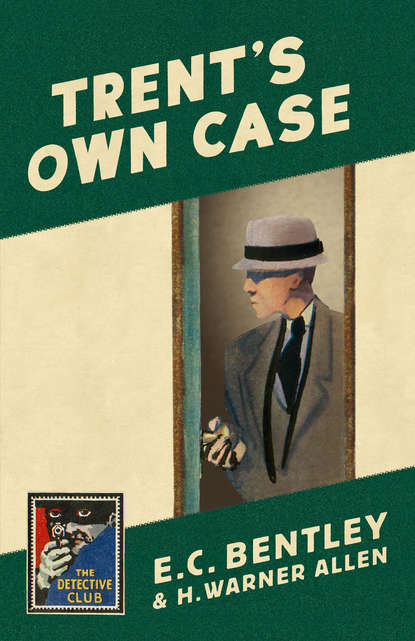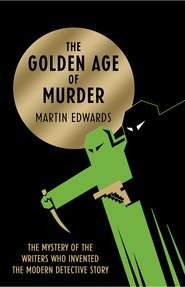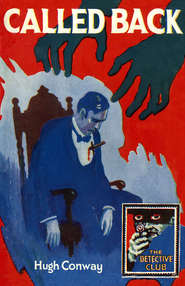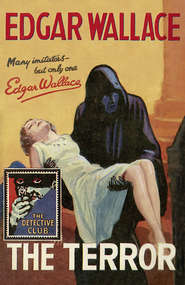По всем вопросам обращайтесь на: info@litportal.ru
(©) 2003-2024.
✖
Trent’s Own Case
Автор
Год написания книги
2019
Настройки чтения
Размер шрифта
Высота строк
Поля
‘There was nothing regular about it, sir. Every few weeks—I couldn’t put it any nearer than that; sometimes it was more frequent—we would come down for two or three days. Or we might go back to Brinton the next day. This time we came the day before yesterday, the Tuesday.’
‘Well, now about Mr Verney.’
‘He was often up at Brinton, sir, the place in Yorkshire; but he didn’t live there. He had rooms here in London, in Purvis Crescent, No. 36—off Willesley Road; I believe he spends a lot of time running the Randolph Institute, sir, in Kilburn—a sort of club, that is, for young men and boys. Whenever we were here, Mr Verney would come in, having his own door-key, to talk business. I should have expected to see him here before this, sir.’
Mr Bligh took another note; then once more he fixed the man before him with an intimidating eye.
‘And where do you say you were last night, when your employer was murdered?’
Raught repeated the account of his movements of which the inspector had already learned the substance. It had been the valet’s half day off, as it always was on Wednesdays. He had not gone out until a little before 6:30, when he had done so after laying out Mr Randolph’s clothes for a dinner which he was to have attended. Raught, on leaving, had gone straight to the Three Tuns in Rowington Street, where he had spent some time, and had afterwards visited the Running Stag in Gooch Street. He had often ‘used’ both places while in London, and was well known. Miss Whicker at the Tuns and Archie at the Stag could bear out his statement. Raught had then joined his sister, Mrs Livings, and her husband at the Pilatus restaurant in Warsaw Street at 7:30. After dinner they had gone on to Battersea, where his relations lived, and had visited the Parthenon Cinema, where a film called ‘The Two-Gun Terror’ was being shown. After that he had had a drink at his brother-in-law’s place, and come back to Newbury Place just before twelve o’clock. He was not expected to be back, he explained, before midnight, Mr Randolph being ‘very human’ in that respect.
‘And then?’ Mr Bligh inquired in his uncomfortably colourless tone.
Raught had gone upstairs to see if his master had returned. He had found the bedroom door wide open, the lights on, and his master lying dead on the floor before the dressing-table; it had given him ‘such a turn, sir, as I never had in my life.’ He had ‘felt’ at once that Mr Randolph was dead. There couldn’t be any mistake about it, the valet said, looking at him as he lay ‘all of a heap.’ He had, therefore, rung up the police immediately, being careful to leave everything just as it was. He had seen, when he came in, no signs of any stranger having been about the place. In reply to a question, Raught declared that he had not touched the body, or even examined it closely, his nerves being ‘all to pieces.’ Then how had he known that it was murder, and a case for calling in the police? Raught had not known; he had only ‘supposed it must be that.’
Inspector Bligh now resumed his silent study of Raught’s unprepossessing face. The valet, his eyes wandering in all directions, pulled out a handkerchief and squeezed it between his palms. Suddenly the question was shot at him:
‘Weren’t you in trouble a few years ago?’
‘Well, sir,’ Raught said with that shade of candour peculiar to those found out, ‘there was a small matter of false pretences—’
‘Blackmail, don’t you mean?’ the inspector asked grimly. ‘I thought I remembered your face—it’s a kind I see a lot of.’
Raught licked his lips and took on an injured expression. ‘Truly, sir, it wasn’t blackmail. What would be the use of my telling you a lie? I was in a bit of a ’ole, sir—through betting, it was. I was in Mr Randolph’s service at that time, and with your memory, sir, you may recollect he gave evidence of my good character while I was with him—no man could have acted kinder. I got six months, and when I came out he took me into his service again. Not many gentlemen would have done as much—saving me from drifting from bad to worse, as you may say. I would have given my life for him, sir.’
Raught’s cry from the heart did not impress the inspector, to whose accustomed ear it had not a genuine ring. Nor did he think much of the man’s alibi. The police surgeon had thought it probable that Randolph’s death had taken place not earlier than seven o’clock and not later than ten. Unless both Miss Whicker and Archie should prove able to time their customer’s coming and going with some accuracy, there was room enough in Raught’s tale for him to move about in, before keeping his verifiable appointment in Warsaw Street.
Setting that matter aside for the time being, the inspector opened another line.
‘Do you know anything about any person having an appointment to see your master yesterday evening, or any person who might have been coming here that evening for any reason?’
‘Well, sir, the only appointment Mr Randolph had made—to my knowledge, that is—was at six o’clock, with Mr Trent, the artist, who had been at Brinton painting his portrait some time ago.’
The inspector smiled faintly. ‘Ha! So Mr Trent, the artist, had an appointment at six. Why? Wasn’t Mr Randolph satisfied with the portrait done by Mr Trent, the artist?’
‘Oh! It wasn’t that at all, sir—quite the contrary. Everyone thought highly of the portrait, and I believe Mr Randolph’s intention in asking Mr Trent to call was to arrange about having another portrait done, or I should say a copy, like, of the first one. It was to be hung in the hall of the Institute, sir, the place I mentioned just now. Mr Verney was very keen about it, and though Mr Randolph was not so at first, he came to approve of the idea, sir.’
‘Hm! Very natural he should.’ Mr Bligh gazed thoughtfully out of the window. ‘It was to be a copy, yes? For the Institute—I see. You’re sure it was for the Institute?’
‘Oh yes, sir. Mr Verney was very anxious they should have it. They were speaking of it when Mr Verney was at Brinton last week, sir, and Mr Randolph said he would write a note to Mr Trent at once.’
The inspector suddenly turned his eye on Raught once more. ‘Not hard of hearing, are you?’ he observed agreeably; and as the colour flooded the man’s pale face he added: ‘You’re sure you haven’t forgotten any other little details of this private conversation between your master and his secretary? No? All right. Then Mr Trent called at six?’
‘It was just six, sir, when I opened the door to him,’ Raught said subduedly. ‘It was accidental, sir, as you may say, me being here when he called, because on Wednesdays my time is supposed to be my own after three o’clock. But you know, sir, what the weather was like all yesterday, and I hadn’t anything to do with myself before meeting my sister and her husband at seven thirty, and so I had a bit of a sleep in the afternoon, and then there was my best suit wouldn’t be none the worse for a pressing, and what with one thing—’
‘Never mind all that,’ Mr Bligh snapped. ‘You were still here at six—is that it?’
‘Yes, sir. And when I went to answer the bell, Mr Randolph was just coming out of the sitting-room to answer it himself; and he says: “Oh! You’re here still,” he says. “Well, if that’s Mr Trent at the door,” he says, “show him in here,” he says. So I showed Mr Trent in.’
‘And then what did they talk about?’
‘I could not say, sir.’
‘You didn’t listen, I suppose,’ Mr Bligh remarked dispassionately, ‘because you knew all about it beforehand. Well; what next?’
‘After about a quarter of an hour I heard the sitting-room door open, and Mr Randolph calls to me to show Mr Trent out again, which I did. And that’s all I know, sir, about anyone calling on Mr Randolph yesterday, because I went out for the evening myself a little later, and never come back again till near twelve, like I told you.’
Mr Bligh considered for a few moments, still fixing the unhappy Raught with a baleful eye.
‘You say you were out of here,’ he summed up at last, ‘by not later than 6:30. And your master had a dinner appointment in the City. You have told the sergeant here that the dinner was for eight o’clock, and that Mr Randolph would usually send for a taxi when keeping appointments of that kind. Is that right?’
‘Quite right, sir. He never had his own car in London.’
‘Hm! Time enough,’ the inspector muttered; then: ‘What do you know about a person called Bryan Fairman?’
Raught appeared sincerely surprised at the question. ‘I suppose that would be Dr Fairman, sir?’
‘I shouldn’t wonder,’ Mr Bligh grunted. ‘Who is he?’
‘I believe, sir, he is one of the doctors at the mental ’ospital at Claypoole, which is named after Mr Randolph, and kept up as you probably know, sir, entirely at his expense.’ (Mr Bligh nodded.) ‘I have seen Dr Fairman once, when he was dining at Brinton one evening. I think he had been asked over, sir, to speak about the work he was doing at the mental ’ospital.’
‘You think!’ Mr Bligh remarked with devastating emphasis. ‘You heard what he and Mr Randolph were talking about—that’s what you mean. Well, you’ve seen Dr Fairman. What kind of a man is he to look at? Tall or short? Dark or fair? Give me a description.’
Raught, in evident relief at the thought of some other person having attracted the notice of the police, took a moment for consideration. ‘I saw him only the once, sir, and that would be about three months ago, as near as I can fix it. But I remember him as a gentleman of what you might call medium size, rather thin, with black hair and a little moustache, a bit pale in the face.’
‘About what age? Does he wear glasses?’
‘I should say somewhere in the thirties, sir. I didn’t see him wearing glasses; he seemed to me like a keen-sighted man, his eye being sort of piercing, as they say, when he looked at you. I can’t think of anything else special about him, except his acting a bit nervous-like—jerky in his movements, if you know what I mean, sir.’
‘What about his expression? Pleasant?’
‘’Ardly that, sir. I should call it severe—not unpleasant I don’t mean, not that at all, but as if he wouldn’t laugh very easy. If I may say so,’ Raught added with an air of cringing slyness, ‘Dr Fairman’s expression is a little bit like your own, sir.’
‘Not unpleasant, eh?’ Mr Bligh said. ‘Well, you ought to know. Now then; apart from his appearance, what else do you know about Dr Fairman?’
‘Nothing, sir, only what I’ve heard mentioned in talk sometimes between Mr Randolph and other parties when—’
‘When your ear happened to be in the neighbourhood of the keyhole,’ Mr Bligh suggested pleasantly.
‘No, sir,’ the valet said, as one making patient allowance for the working of a suspicious temperament. ‘In my position, sir, people’s conversation often comes to my ears without me having to listen for it, even in a big ’ouse like Brinton. And as for a small place like this, you can see for yourself, sir, I’d be bound to hear a good deal of what was being talked about unless it was meant to be private—what with doors left open, or me going in and out about my work. And if I know anything about Mr Randolph,’ Raught added with the first touch of genuine feeling that the inspector had noted in him, ‘anything he wanted to be kept private would be kept private.’
‘And no blooming error,’ Mr Bligh prompted him with the ghost of a smile.
‘You take the words out of my mouth, sir,’ Raught said. ‘But I only mean that the old man—Mr Randolph, I should say—was no fool, if he was kind-hearted to a fault, as the saying is. I do know this, sir—if he wanted to see anybody here without the chance of being overheard, it was his habit to make an appointment for the Wednesday evening, which has always been my time off, and open the door to them himself.’
‘No fool, as you say,’ the inspector observed drily.
Raught ignored this offensive interjection. ‘As for what was said about Dr Fairman, his name has come up in conversation more than once between Mr Randolph and Mr Verney. Mr Verney seemed to think a lot of some special job Dr Fairman was doing at the mental ’ospital; what it was I can’t say. I thought Mr Randolph didn’t seem to think quite so much of it—spoke of it a bit short-like. Once, I remember, he said that the worst of these loony-doctors—’










